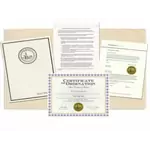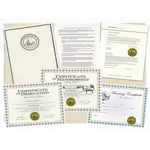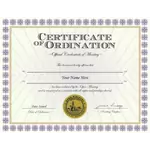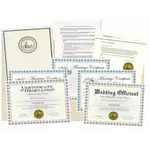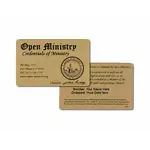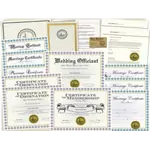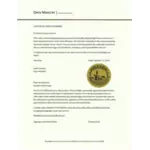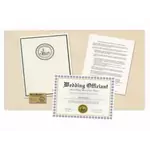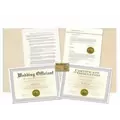State Marriage Laws and Information
Since 2010, Open Ministry has been ordaining and helping people all over the world perform weddings, ceremony and other sacerdotal duties. This page focuses on requirements and information for Kansas; Scroll down to the bottom of the page for links to other states.
How to get ordained and perform a wedding in Kansas
If you are planning to get ordained in Kansas or you have been asked to perform a wedding ceremony in Kansas, or simply need to to find an ordained minister in Kansas to perform your wedding ceremony.
This ordination information forKansas is provided below in an easy five step layout which is designed help walk you through the most common steps on registering to become a minister for Kansas and how perform a wedding ceremony in Kansas.
Step 1 - Get Ordained Online for free with Open Ministry
Step 1: Get Ordained in Kansas with Open Ministry
Becoming an ordained minister in Kansas is completely free and fully online with Open Ministry. In under 3 hours you’ll receive your ordination confirmation by email. Printed hard-copy certificates are available at our bookstore - empowering you to officiate weddings and marriage ceremonies anywhere in Kansas.
When you get ordained in Kansas through Open Ministry, you’ll enjoy:
- Quick online ordination - apply anytime, from any device.
- Free lifetime ordination - complete in under 5 hours.
- Optional printed certificates - available at our bookstore.
- Statewide acceptance - recognized in every Kansas county.
- Unlimited officiant rights - weddings, vow renewals, and more.
How It Works
- Click the Get Ordained in Kansas button below.
- Complete our secure online ordination form.
- Receive your free ordination and order printed certificates for your records.
As a fully ordained minister in Kansas, you’ll hold legal authority to create memorable wedding experiences and solemnize marriages across the state.
Open Ministry ordination is free and fast-printed certificates available for purchase. Start now!
Step 2 - Contact The County Clerk
How to Register to Officiate a Marriage in Kansas
Next, contact the office of your local marriage authority (typically your county clerk in Kansas). Let them know that you are a ordained minister with Open Ministry in California, and ask them what information the will require of you, to officiate a marriage in Kansas. Most clerks and governing agencies may require that you present them with a physical copy of your ordination record.
When speaking with the county clerk; it can be helpful to use the following phrases.
- What agency or department issues marriage licenses in your county and how may I contact them?
- I am an ordained minister with a church in California and I would like to register as a wedding Officiant in your county to perform and solemnize weddings.
- I have my Letter of Good Standing and/or Ordination Credential as proof of my ministry and ordination.
- What additional documentation is required for me to register as a wedding Officiant in your county or state?
Step 3 - Get registered to perform a Marriage
License to perform a wedding in Kansas
After you've contacted your marriage authority, you will want to visit our bookstore to get physical copies official credentials for presentation and your records. (See Kansas State Statutes for More Specific Requirements )
When registering in Kansas you may be asked to display proof of your ordination to the county clerk's before they will accept the marriage license as having been legally solemnized. We typically advise ministers of Kansas to get a Complete Minister Package for Kansas which includes your Letter of Good Standing (the live signed and notarized physical copy of your standing with our ministry).
Having your physical copies credentials provides peace-of-mind to couples and others that you intend to marry. Additionally, we recommend at least 4 weeks between the date of the wedding ceremony and your order, to ensure that you receive all of your materials and are able to register in time. Please note that every state and county can impose different requirements. This may include other nominal fees and additional paperwork that may need to be completed before the ceremony can take place.
It is important to note that some county clerks in Kansas may require wedding officiants to attach a statement which asserts some of the elements in the marriage license upon submission, including the following:
- The time and location at which the wedding took place
- The names and places of residence of all official witnesses
- The religious organization in which the officiant is ordained
- The printed name and address of the officiant
Please note that, when filling out a marriage license, that Kansas State may request you use the title "Minister" or "Reverend". The County Clerks may also require you enter your denomination, you can use "Non-Denominational". Failing to state a denomination may result in rejection and could require a duplicate marriage license.
Step 4 - How to Perform the Wedding
How to perform a wedding in Kansas
Once you have completed of the above, you are ready to perform the wedding! Be sure that the couple has picked up their Kansas state issued marriage license from the appropriate office. Kansas marriage licenses valid for a set number of days, and there may be a waiting period between when the couple receives the marriage license in Kansas and when the ceremony may be legally performed in Kansas. This information should be written on the license and followed to ensure the ceremony is recorded properly.
Please be aware that the signed license must be returned to the issuing office in Kansas before the time limit is reached. Check the marriage license for the exact dates. Once the the previous matters have been addressed, officiating a wedding in Kansas can be a great and wonderful experience.
If you have any comments or issues as a wedding officiant in Kansas, or after you have been ordained, or would like to just asking for guidance on how to perform a wedding ceremony in Kansas. We recommend that all new Kansas wedding ministers who have issues or concerns about the ceremony read over our helpful guides.
Kansas
23-104a Solemnizing marriage; persons authorized to officiate
(a) Marriage may be validly solemnized and contracted in this state, after a license has been issued for the marriage, in the following manner: By the mutual declarations of the two parties to be joined in marriage, made before an authorized officiating person and in the presence of at least two competent witnesses over 18 years of age, other than the officiating person, that they take each other as husband and wife.
(b) The following are authorized to be officiating persons:
(1) Any currently ordained clergyman or religious authority of any religious denomination or society;
(2) any licentiate of a denominational body or an appointee of any bishop serving as the regular clergyman of any church of the denomination to which the licentiate or appointee belongs, if not restrained from so doing by the discipline of that church or denomination;
(3) any judge or justice of a court of record;
(4) any municipal judge of a city of this state; and
(5) any retired judge or justice of a court of record.
(c) The two parties themselves, by mutual declarations that they take each other as husband and wife, in accordance with the customs, rules and regulations of any religious society, denomination or sect to which either of the parties belong, may be married without an authorized officiating person.
Chapter 23: Domestic Relations - Article 1: Marriage
History: L. 1968, ch. 207, § 1; L. 1973, ch. 134, § 26; L. 1984, ch. 134, § 1; L. 1996, ch. 194, § 2; July 1.

